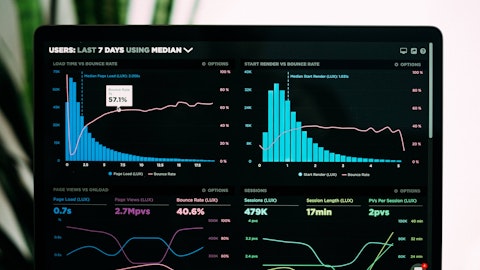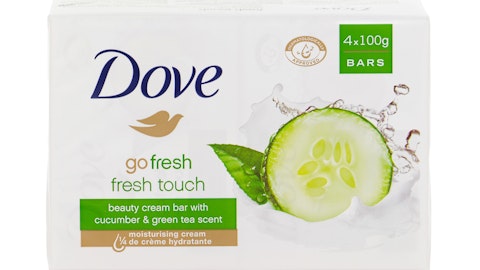Bruno Monteyne: When I sort of listen to the planned new update, it’s clear that some of the actions in almost all the actions about focusing on proud brands, product superiority, it could have been part of the Capital Markets Day before Christmas. But I guess that’s only natural and to be expected. It’s unlikely to come up with some silver bullet, an action that people haven’t talked about. So I tried to prefer to like focus on the weaknesses, what do you identify as not having gone well in the past? And you have some slides on there, but it tend to talk about the outcomes, let’s say, low volume growth, low earnings growth. But that doesn’t really explain why sort of Unilever. What did it do wrong? What’s wrong with Unilever that is in this position and this discussion has been gone for a few decades.
So, I’m going to try to probe a little bit deeper in your view since the time you’ve been there why this is happening in that. I’ll give a few on suggestions to see what you think about it. So how much of that performance is really attributable to the Board and the governance because for albeit you talk about weak performance target we stressed, surely, those are part of the Board, are they failing and is just replacing the Chairman, therefore good enough. The second one is company leadership, but that’s why the performance is weak. I’m thinking, for example, that your own reference execution levels, CapEx, was great for years that it was high enough to support the growth. Was that with a mistake less or even more importantly, what is the culture of the Company that’s wrong and therefore, probably still wrong?
I’m just reminiscing about one of my colleagues here asking about excuses of why competitive needs might be so low by referring to other parts and not captured. That seems to be a culture of complacency sort of referring to what isn’t captured on focusing on the per measure. So if you could just try to comment and discuss why the performance has been so weak? Is it the Board, company leadership? What is its culture, all of the above or something different? Now my second question is building on the previous question, you’re targeting 3% to 5% organic. I think Graeme sort of agreed that the kind of negative impact of FX, structurally about minus 1.5% so you’re really saying that the Company is targeting a net revenue euro growth of about 1% to 3% which is probably barely in line with euro inflation.
So is there for the medium-term target to still be shrinking in real terms in euros using those previous numbers from the goal?
Hein Schumacher: Thanks, Bruno, for your questions. I’ll take — I’ll certainly take the first part and refer the second one to, Graeme, but I think that can be a fairly short answer. But let me talk about the first part. And it’s a pretty wide-ranging question. And yes, I talked a bit about it in the video, but let me just reiterate a few points. I think the question on what is wrong with Unilever, look, I don’t think you would hear me go there, I would say, look, Unilever has very, very strong fundamentals and many strengths. But at the same time, sometimes there is a sunny side and sunny side meets to a shadow side and that’s what I tried to point out in the video, but let me just give you a few examples. Unilever has strong science and technology capabilities without a single doubt, and I think this comes back to the question of Warren, why haven’t we delivered these innovations that at scale?
Well, you need to be disciplined on making choices behind which brands to do what, but also what technologies are really differentiating and where can we make them scalable and multi-year that’s super important, not stop and start. And I think that may have happened somewhat. If you think about a team like sustainability, I think we have spent a huge amount of time and investment and thinking in this area, and it has led to a — yes, I think to us being certainly perceived as the leader in our field. And that’s in general, that’s a positive. But it may have diluted our efforts somewhat in that area. When you think about our talent base and about performance culture, look, I think Unilever is outstanding people. There is no doubt about it. We are the preferred employer in many of the markets that I visited and where we operate.
But at the same time, there is an opportunity to dial up the performance edge. And that is, as you say, that is not a silver bullet. That comes back to a number of very specific actions, but mostly it’s related to making clear choices setting clear priorities and simplifying everything that we do. So look, I can go on, but then I would repeat my video, but I think those are for me some of the key points. Is that the Board, I wouldn’t comment on that or the leadership. Every incoming CEO inherits a situation and looks at that situation through his or her lens and then tries to improve from there. And that’s exactly what I’m doing. And yes, we’re making some changes today to the course of action to the leadership and so forth, and that underscores, I think, the direction that I’m very keen to take.
But overall, it’s about discipline, clear priorities, walking the talk and making sure that the Company is truly steered with a much higher emphasis toward performance. That’s where I would summarize it. Graeme, on the medium-term growth algorithm?
Graeme Pitkethly: So the difference between bottom line earnings constant and current growth that I gave in response to Guillaume question, that’s bottom line. I don’t think it would be right to assume that taking our 3% to 5% range and taking 2% off the bottom end of that means that we will grow in euro terms below real rates of inflation, et cetera. I don’t think that’s the right extension from it. I mean some people might ask, well, with all of the elements of our action plan that are in place for the period ahead. Why still 3% to 5%? I want to be clear that we know what it takes to get this company back up to top 30 SR performance. When we back solve for that, driving a rate of consistent growth delivery to the upper end of that 3% to 5% range is absolutely sufficient with the other levers that we have down through the P&L to deliver a rate of earnings growth that will deliver top third TSR performance.





